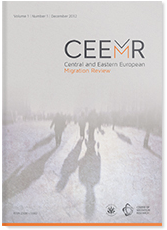Social Remittances from the Professional Diaspora: The Issue of Home-Country Receptivity
Social Remittances from the Professional Diaspora: The Issue of Home-Country Receptivity
Author(s): Laima NevinskaitėSubject(s): Social Sciences, Sociology, Migration Studies
Published by: Ośrodek Badań nad Migracjami / Uniwersytet Warszawski
Keywords: professional diaspora; diaspora option; social remittances; knowledge transfer; home-country receptivity
Summary/Abstract: This article deals with the issue of home-country receptivity towards social remittances from the professional diaspora. Social remittances from the highly skilled depend on a favourable context for knowledge and skills transfer in their home countries, a context that could be summarised by the term ‘country receptivity’. This article is based on the case of Lithuania. The data comes from a series of semi-structured interviews with members of the skilled diaspora and representatives of institutions that are involved in programmes targeted at the diaspora. The analysis reveals several groups of obstacles to successful knowledge and skills transfer that may be understood as issues of country receptivity: mistrust of government by diaspora members, expressed as a belief that it is not interested in results and thus involvement of the diaspora, but rather in pursuing particular political objectives; lack of openness towards other experiences (unwillingness of institutions at different levels and in various fields to open up to new opinions, approaches and experiences brought by Lithuanians from abroad); bureaucratic and institutional impediments (inability of institutions to adapt their procedures in the interests of cooperation; slowness and ineffectiveness when dealing with requests or reacting to initiatives from the diaspora); and a perceived negative opinion (unwelcoming attitude) in society towards Lithuanians from abroad. The interviews also provide some tentative evidence of a ‘feedback loop’, through which the involvement of the diaspora causes changes in the home-country institutions. In the discussion part of the article, possible causes and implications of these obstacles are considered.
Journal: Central and Eastern European Migration Review
- Issue Year: 5/2016
- Issue No: 2
- Page Range: 135-153
- Page Count: 19
- Language: English

